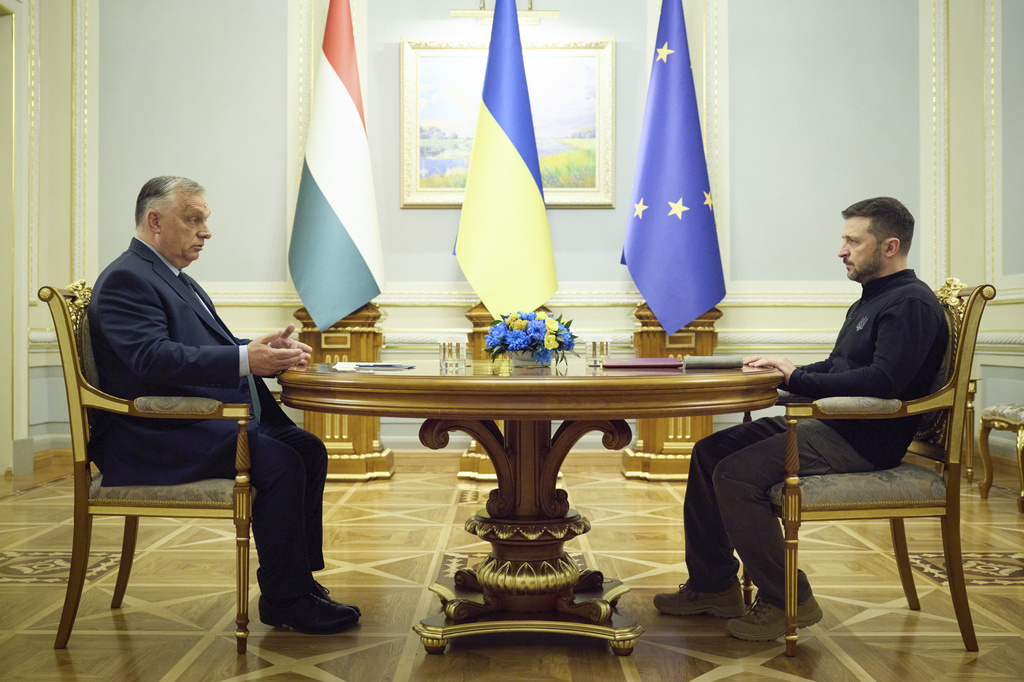The ongoing war in Ukraine now approaching its third year has become the centerpiece of a sharp exchange between Hungarian Prime Minister Viktor Orbán and Ukrainian President Volodymyr Zelensky on social media.
As the conflict drags on, Zelensky’s rigid insistence on a comprehensive, idealistic vision of peace has clashed with Orbán’s pragmatic and humanitarian-driven approach, raising critical questions about the path to ending the bloodshed.
In a social media post on Wednesday, President Zelensky quipped that he hopes Orbán won’t call deposed Syrian leader Bashar Al-Assad, who allegedly took refuge in Russia, “to listen to his hour-long lectures as well,” taking a swipe at the Hungarian prime minister’s recent attempts to bring about peace in the country.
Zelensky added that the only way to achieve “real peace and guaranteed security” for Ukraine was for a continuous of the bloody dog-fight, aided by “America’s determination, Europe’s unity, and the unwavering commitment of all partners to the Purposes and Principles of the U.N. charter.”
“No one should boost personal image at the expense of unity; everyone should focus on shared success,” the Ukrainian leader added in a thinly-veiled attack on the Hungarian prime minister.
His calls for international solidarity are not new, and underline a rigid vision for peace that demands substantial global involvement — an approach increasingly at odds with the fatigue felt by many nations and the increasingly apathetic public opinion.
In a sharp exchange, Orbán hit back on X, writing, “At the end of the Hungarian EU presidency, we made new efforts for peace. We proposed a Christmas ceasefire and a large-scale prisoner exchange.
“It’s sad that President Zelensky clearly rejected and ruled this out today. We did what we could,” he added.
Orbán has championed an achievable, humanitarian-first strategy focused on immediate relief and dialogue to bring about peace in Ukraine. His “peace mission 5.0” has taken him across the globe, meeting with leaders committed to de-escalating the conflict and addressing its devastating human cost.
His statement underscores the Hungarian leader’s frustration with Zelensky’s intransigence and an unwillingness to embrace practical steps that could build trust and alleviate suffering while allowing prisoners of war to reunite with their families at Christmas.
Zelensky’s idealistic vision for peace hinges on sustained international support, yet it risks alienating potential partners who are increasingly wary of endless escalation. The war has inflicted untold suffering with hundreds of thousands of casualties and millions more displaced.
Despite this, Zelensky has resisted interim measures like ceasefires, viewing them as concessions that could embolden Russia. This week, he slapped down calls from U.S. President-elect Trump for an immediate ceasefire, insisting no agreement would be reached without security guarantees.
Zelensky added that the conflict cannot end with “just a piece of paper and a few signatures.”
As the Ukrainian leader doubles down on an uncompromising vision of peace, the international community faces a dilemma: how to balance support for Ukraine with the need for pragmatic steps toward resolution. Orbán’s efforts, though criticized by some as undermining Western unity, present a viable path to immediate relief for those most affected by the war.
Zelensky’s rejection of Orbán’s proposals risks not only prolonging the conflict but also alienating potential allies who may view his strategy as increasingly untenable. In the meantime, Orbán’s peace mission continues, reflecting a commitment to humanitarian action over idealistic posturing.






